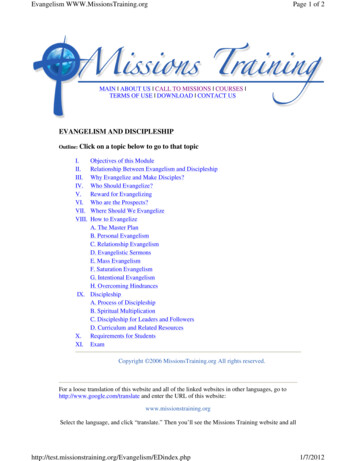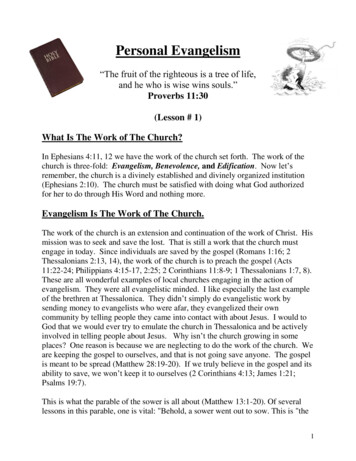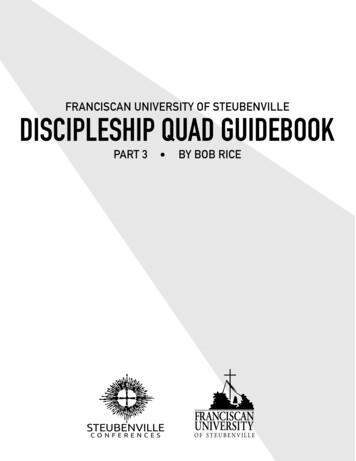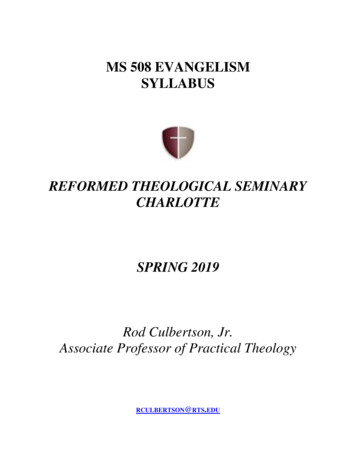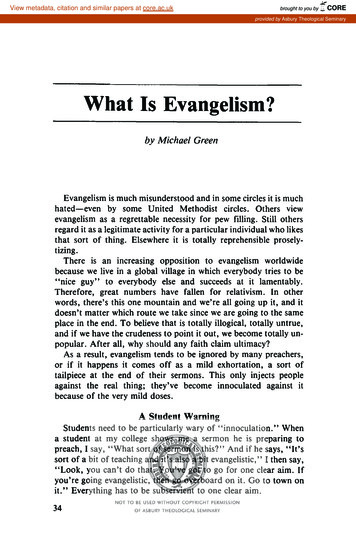
Transcription
THEDISCIPLESHIP EVANGELISMCOURSE48-lessonsCondensed Version and WorkbookbyDon W. Krowwith Andrew Wommack
Unless otherwise indicated, all Scripture quotations are taken from the King James Versionof the Bible.Original Title: The Discipleship Evangelism CourseISBN 978-1-906241-20-9 2004 by Don W. KrowAll rights reserved under International Copyright Law.Permission is granted to duplicate or reproduce for discipleship purposes onthe condition that it is distributed free of charge.2
TABLE OF CONTENTSLevel 1 - Lesson1. Eternal Life2. Salvation by Grace3. Righteousness by Grace4. Relationship with God5. The Nature of God6. Repentance7. Commitment8. Water Baptism9. Identity in Christ (Part 1)10. Identity in Christ (Part 2)11. What Happens When A Christian Sins12. Integrity of God’s Word13. God’s Not Guilty14. The Power of a Spirit-Filled Life15. How To Receive The Holy Spirit16. The Benefits of Speaking In Tongues14811151924273034374043465054Level 2 - Lesson1. Self Centeredness: The Source of All Grief2. How to Meditate on God’s Word3. Renewing the Mind4. The Importance of Christ’s Church5. Deliverance6. Authority of the Believer7. Healing is in the Atonement8. Hindrances to Healing9. Forgiving Others10. Marriage (Part 1)11. Marriage (Part 2)12. God’s Kind of Love (Part 1)13. God’s Kind of Love (Part 2)14. Finances (Part 1)15. Finances (Part 2)16. What To Do When Your Prayers Seem el 3 - Lesson1. The Divine Flow2. Using The Gifts To Minister3. Miracles Glorify God4. The Power Of Godly Relationships5. Persecution6. The King and His Kingdom7. The Object of Saving Faith8. The Proper Use of God’s Law9. Not Under Law, But Under Grace10. No More Consciousness of Sin11. I Am Loved, I Am Pretty12. The Fruit of Salvation (Part 1)13. The Fruit of Salvation (Part 2)14. A Call To Discipleship15. How To Use Your Testimony16. Using Everyone’s Gifts To 1821883
Level 1 - Lesson 1ETERNAL LIFEBy Andrew WommackOne of the most familiar passages of Scripture is John 3:16. It seems like everybody knowsthat verse from a young age, yet I believe it has really been misunderstood and misapplied.John 3:16 says, “For God so loved the world that he gave his only begotten Son, thatwhosoever believeth in him should not perish but have everlasting life.”Traditionally, this scripture has been used to teach that Jesus came and died for oursins so that we wouldn’t perish. As true as this is, this verse is saying that the real purpose ofJesus coming to this earth and dying for us was so that we could have everlasting life. It justso happened that our sins were a barrier that stood between us and this everlasting life.It is true that Jesus did die for our sins, and it is true that if we believe on Jesus, wewill not perish, but there is much more to the Gospel than that. The real message of theGospel is that God wants to give you everlasting life. Now let me explain that.The night before His crucifixion, Jesus was praying, and He said this, “This is lifeeternal, that they might know thee the only true God, and Jesus Christ” (John 17:3).This says that everlasting life is knowing the Father, the only true God, and knowingJesus Christ, whom He has sent. That’s what everlasting life is. Many people think thateverlasting life is living forever. Well, every person lives forever. It’s a misconception tothink that when a person dies they cease to exist. The spirit and the soul go back to God.The body decays in the grave. The truth is, every person who has ever lived on the face ofthe earth will continue to live in spirit form. So to say that eternal life is living forever is notthe whole truth – everybody lives forever. This verse makes it very clear that eternal life isnot given to everyone.Some people would say, “Eternal life is living forever in heaven versus living forever inhell.” But eternal life is just what Jesus said in John 17:3 – to know God and Jesus Christ. It’smore than an intellectual knowledge. This word “know” is used throughout Scripture to describethe most intimate, personal relationship that you can have.The real purpose of salvation is not living forever in heaven, as great as that will be.The real purpose of salvation is to have intimacy – a personal relationship with the LordGod. There are multitudes of people who have cried out to God for the forgiveness of theirsins but have never had intimacy with God as a goal.By not explaining the real purpose of salvation, we are doing a disservice to theGospel. When we present salvation as something that deals with just spiritual things thatwill only benefit us in the future, in eternity, we are not helping people. There are somepeople who are living in such a literal hell right now on earth. Many are depressed, living inpoverty, dealing with strife, rejection, hurt, and failed marriages. People are just trying tosurvive day to day. They are just trying to keep their heads above water. By makingsalvation something that deals only with the future, many people put off that decision4
because they are too busy just trying to survive today.The truth is that Jesus not only came to affect our eternal destinies so that we canlive forever in heaven in blessing instead of the punishment and curse of hell, but Jesus alsocame to deliver us from this present evil world (Gal. 1:4). Jesus came to give you intimacyand a personal relationship with God the Father today.Jesus came to bring you back into close, personal relationship with Him. Jesus lovesyou. Jesus wants to know you personally. Jesus wants to give you a quality of life that isgreater than anything you could obtain through any other source.Jesus put it this way in John 10:10: “The thief [speaking of Satan] cometh not, butfor to steal, and to kill and to destroy: I am come that they might have life, and that theymight have it more abundantly” (brackets mine). God wants to give you eternal life. Godwants to give you abundant life, and I believe that you need that today – that you want that.Christ died not only to forgive your sins, but to bring you close to him. If you don’t knowthe Lord, you need to know Him for that purpose. If you’ve already been born again, youneed to go beyond just getting your sins forgiven and enter into everlasting life with theFather.Facts about Eternal LifeA. The purpose of the Gospel is eternal life. (John 3:16).B. Eternal life is knowing God. (John 17:3).C. Knowing God is an intimate relationship. (1 Cor. 6:16-17).D. Eternal life is available now. (1 John 5:12).E. God wants a personal relationship with you. (Rev. 3:20).Discipleship Questions1. Read John 3:16. What was the purpose of God sending Jesus into the world?2. The biblical usage of the word “know” means to have an intimate, personal relationshipwith a person (Gen. 4:1). Read John 17:3. What is eternal/everlasting life, according tothis verse?3. Read 1 John 5:11-12. According to these verses, when does eternal, or everlasting, lifebegin?4. Read John 10:10. What kind of life did Jesus come to give us?5. Explain in your own words the quality or attributes of an abundant life.6. Do you believe that God sent His Son Jesus into the world to die for the sins of theworld, thereby giving us who believe eternal/everlasting life?7. Is it clear to you that eternal/everlasting life is not only a length of time (eternity) but aquality and quantity of life?5
Scriptures to Use with QuestionsJohn 3:16 – “For God so loved the world, that he gave his only begotten Son, thatwhosoever believeth in him should not perish, but have everlasting life.”Genesis 4:1 – “And Adam knew Eve his wife; and she conceived, and bare Cain, and said, Ihave gotten a man from the LORD.”John 17:3 – “And this is life eternal [eternal life], that they might know thee the only trueGod, and Jesus Christ” (brackets mine).1 John 5:11-12 – “[11] And this is the record, that God hath given us eternal life, and thislife is in his Son. [12] He that hath the Son hath life; and he that hath not the Son of Godhath not life.”John 10:10 – “The thief cometh not, but for to steal, and to kill, and to destroy: I am comethat they might have life, and that they might have it more abundantly.”Answer Key1. Read John 3:16. What was the purpose of God sending Jesus into the world?To save the world, giving all who believe on Jesus everlasting life by removing sin’spenalty.2. The biblical usage of the word “know” means to have an intimate, personal relationshipwith a person (Gen. 4:1). Read John 17:3. What is eternal/everlasting life, according tothis verse? Eternal life is knowing God and Jesus Christ (not physically butintimately).3. Read 1 John 5:11-12. According to these verses, when does eternal/everlasting lifebegin? When we receive the Son (Jesus Christ) into our lives.4. Read John 10:10. What kind of life did Jesus come to give us? Abundant life!5. Explain in your own words the qualities or attributes of an abundant life. Abundant lifewould be the opposite of what Jesus said the thief came to do.6. Do you believe that God sent His Son Jesus into the world to die for the sins of theworld, thereby giving us who believe eternal/everlasting life? Yes.7. Is it clear to you that eternal/everlasting life is not only a length of time (eternity) but aquality and quantity of life? Yes.6
Level 1 - Lesson 2SALVATION BY GRACEBy Don KrowJesus many times used parables, stories which illustrated spiritual truths. Luke 18:9-14begins, “And he spake this parable unto certain which trusted in themselves that they wererighteous, and despised others.” Jesus was targeting a certain audience: those who trustedthat they were righteous and automatically despised and looked down on everyone else. Hetold this parable to these people who trusted in the things they did. We would call them selfrighteous, which is what Jesus was speaking about when He said they looked down oneveryone else saying, “I am better than you!”In verse 10, Jesus says, “Two men went up into the temple to pray; the one aPharisee, and the other a publican.” We would say in modern language that they went tothe church to pray, and one was a Pharisee. A Pharisee was a very religious person. Theword actually means “separated one”, someone who was so religious that in a sense theywould say, “Don’t defile me! Don’t get too close to me. I’m not like other men! I am betterthan everyone else!” The other man Jesus mentioned was a publican. Publicans were taxcollectors and were known to be very evil, sinful people who cheated and defrauded. Theycollected taxes by any means they could, stuck a lot of the money in their pockets, and gavesome of it to the Roman government, so they were not looked upon favourably by theirpeers.The story continues in verse 11, “The Pharisee stood and prayed thus with himself,God, I thank thee, that I am not like other men are, extortioners, unjust, adulterers, or evenas this publican.” I want you to notice that. Who was he praying to? He was actuallypraying to himself even though he was saying “God” and using the right words. God wasnot acknowledging his prayer, and we’ll see later why that was so. Notice that he prayed,“God, I thank You I am not like other men.” This Pharisee, this religious man, said, “I amnot like other men. I am not sinful. I am not an extortioner, not unjust, not an adulterer, and Iam not like this publican right here who came to pray.” You see, he despised and lookeddown on others because he thought he was better than them.In verse 12, the Pharisee said, “I fast twice in the week, I give tithes of all that Ipossess.” He was saying, “Notice what I do?” Do you know what it means to fast? Itactually means to go without food. He also gave money to the church. He was one of thosepeople who say, “Don’t bother me! I live a good life! I give to charity! I give money downat the church!”Then we come to the tax collector in verse 13: “And the publican, standing afar off,would not lift up so much as his eyes unto heaven, but smote upon his breast, saying, God bemerciful to me a sinner.” Notice his body language: “standing afar off”. He didn’t even goall the way into the church. He was so ashamed of his life and the things that he had donethat he stood afar off and wouldn’t even look up, wouldn’t lift his eyes to heaven, but smotehis breast. When the Bible talks of smiting the breasts in the Old Testament, many timesthey also tore their garments, which was a way of saying, “I am sorry, God, for what I havedone!” It was a sign of repentance, a contrite heart, and a broken spirit, which God wouldnot despise. This tax collector, sinful man that he was, cried out to God and prayed, “God bemerciful to me, I am a sinner!”7
Verse 14 says, “I tell you, this man went down to his house justified rather than theother: for every one that exalteth himself shall be abased; and he that humbleth himselfshall be exalted.” The publican went home justified, declared righteous before God, inright-standing with God, forgiven by God. Why was he forgiven? Why did he go to hishome in right standing before God and not the religious Pharisee? It was because thePharisee exalted himself, saying “I am better than other people! I am not sinful! I am notlike other men,” while the tax collector knew he had no standing before God, nothing hecould offer Him. He was a sinful person. The Bible says Jesus didn’t come to save righteouspeople but sinners, and we have all sinned and come short of the glory of God. This taxcollector humbled himself and found forgiveness and pardon.We’re talking about salvation by grace. Grace is a wonderful word, and I am goingto give you an accepted definition of what it means, but grace means much more. In theGreek language in which the New Testament was written, grace is the word charis. Anaccepted definition of grace is this: the free, unmerited favour of God toward people whodon’t deserve it. This tax collector didn’t deserve anything from God, but he found God’sfavour because he humbled himself. There is another word in the Greek, charisma, which ischaris with the suffix ma on the end. It means a specific manifestation or form of God’sgrace, and this tax collector found justification, right standing, before God as a gift.Romans 5:17 says, “They which receive abundance of grace and of the gift ofrighteousness shall reign in life by one, Jesus Christ.” God offers you and me right standingbefore Him as a gift and, according to our passage, the tax collector found that gift ofjustification, that gift of righteousness that only comes through Jesus Christ. The Bible saysin John 1:17, “For the law was given by Moses, but grace and truth came by Jesus Christ.”This grace is only offered to one kind of person – those who humble themselves and knowthey have no standing before God, who cry for God’s mercy. These people will find God’smercy and pardon.Discipleship Questions1. Read Luke 18:9. What is a parable?2. Read Luke 18:9. To whom did Jesus direct this parable?3. Read Luke 18:9 (the last part of the verse). People that are self-righteous always revealan attitude toward others. According to Luke 18:9, what is that attitude?A. They like others.B. They despise others or look down on others.C. They love others.4. Read Luke 18:10. Two people went to pray; in modern language, where did they go topray?5. Read Luke 18:10. Who were these people?6. Read Luke 18:11. What was the Pharisee’s prayer?7. Read Luke 18:12. What does fasting mean?8. Read Luke 18:12. What does it mean to give tithes?8
9.Read Luke 18:13. Where was the tax collector standing? Why?10. Read Luke 18:13. Why did the tax collector hang down his head and not look up?11. Read Luke 18:13. What was this tax collector’s prayer?12. Read Luke 18:14. Which one of these men was declared righteous before God when hewent to his home?13. Read Luke 18:14. Why was the tax collector declared righteous and not the Pharisee?14. Read Luke 18:14. Did God forgive this tax collector?15. Read Romans 10:13. If you right now got down on your knees and cried out to Godfrom your heart “God be merciful to me, a sinner,” would God treat you the same wayHe treated the tax collector?Scriptures to Use with QuestionsLuke 18:9 – “And he spake this parable unto certain which trusted in themselves that theywere righteous, and despised others.”Luke 18:10 – “Two men went up into the temple to pray; the one a Pharisee and the other apublican.”Luke 18:11 – “The Pharisee stood and prayed thus with himself, God, I thank thee, that Iam not as other men are, extortioners, unjust, adulterers, or even this publican.”Luke 18:12 – “I fast twice in the week, I give tithes of all that I possess.”Luke 18:13 – “And the publican, standing afar off, would not lift up so much as his eyesunto heaven, but smote upon his breast, saying, God be merciful to me a sinner.”Luke 18:14 – “I tell you, this man went down to his house justified rather than the other: forevery one that exalteth himself shall be abased; and he that humbleth himself shall beexalted.”Romans 10:13 – “For whosoever shall call upon the name of the Lord shall be saved.”1 John 1:8-9 – “If we say that we have no sin, we deceive ourselves, and the truth is not inus. If we confess our sins, he is faithful and just to forgive us our sins, and to cleanse usfrom all unrighteousness.”Answer Key1. Read Luke 18:9. What is a parable? A biblical parable is a story that illustratesspiritual truth.2. Read Luke 18:9. To whom did Jesus direct this parable? To those who trusted inthemselves that they were righteous; that is, they were self-righteous.9
3. Read Luke 18:9 (the last part of the verse). People that are self-righteous always revealan attitude toward others. According to Luke 18:9, what is that attitude?B. They despise others or look down on others.4. Read Luke 18:10. Two people went to pray; in modern language, where did they go topray? To the church.5. Read Luke 18:10. Who were these people? A Pharisee and a publican/tax collector.6. Read Luke 18:11. What was the Pharisee’s prayer? God, I thank you I am not likeother men (I’m not a sinner). I’m not a swindler, unjust, an adulterer, or even likethis tax collector.7. Read Luke 18:12. What does fasting mean? To go without food.8. Read Luke 18:12. What does it mean to give tithes? To give a tenth of one’s income.9. Read Luke 18:13. Where was the tax collector standing? Afar off. Why? He wasashamed to go into the church (or temple) because he was such a terrible sinner, sohe stayed outside.10. Read Luke 18:13. Why did the tax collector hang down his head and not look up? Hewas ashamed. Have you ever done something wrong and would not look a person inthe face?11. Read Luke 18:13. What was this tax collector’s prayer? God be merciful to me; I am asinner!12. Read Luke 18:14. Which one of these men was declared righteous before God when hewent to his home? The tax collector.13. Read Luke 18:14. Why was the tax collector declared righteous and not the Pharisee?Because he humbled himself before God. The Pharisee was full of pride; he didn’tthink he needed a Saviour.14. Read Luke 18:14. Did God forgive this tax collector? Yes.15. Read Romans 10:13. If you right now got down on your knees and cried out to Godfrom your heart “God be merciful to me, a sinner,” would God treat you the same wayHe treated the tax collector? Yes, He would. He would forgive me and cleanse mefrom all unrighteousness. See 1 John 1:8-9.10
Level 1 - Lesson 3RIGHTEOUSNESS BY GRACEBy Don KrowToday we are going to look at the subject of righteousness by grace. Romans 3:21-23 says,“But now the righteousness of God without the law is manifested, being witnessed by thelaw and the prophets; Even the righteousness of God which is by faith of Jesus Christ untoall and upon all them that believe: for there is no difference [distinction]: For all havesinned, and come [fall] short of the glory of God” (brackets mine).Notice that this scripture says, “But now the righteousness of God without the law ismanifested.” I once asked a man, “What do you think you have to do in order to go toheaven?” He responded that he should keep the Ten Commandments, be faithful to his wife,live a moral life, plus a number of other things. I said, “Do you know what you have to do inorder to go to heaven, to be in God’s presence or in His kingdom? You would have to havea righteousness that equals God’s righteousness.” He said, “I beg your pardon? There is noone who can have a righteousness that equals God’s. Only one man had such righteousness,and that was Jesus Christ!” I said, “You have the point! That is exactly right! None of us inour own selves have ever kept the Law or commandments perfectly, outwardly or inwardly,but we need a righteousness that equals God’s in order to be acceptable before Him.”That is exactly what is said in verses 21-22, “But now the righteousness of Godwithout the law is manifested even the righteousness of God which is by faith of JesusChrist unto all and upon all them that believe ” The kind of righteousness that God offersyou and me is a righteousness that is “through faith in Jesus Christ”, and it’s unto all andupon all who believe. There are two kinds of righteousness – the righteousness of man andthe righteousness of God. The righteousness of man is a person’s very best behaviour andthe good works they do, but that can’t make you acceptable before God. You need arighteousness that equals God’s, and He is offering it to you – the righteousness of God thatis without the law.In the Greek, there is no definite article, which means that this text is really sayingGod is offering His own righteousness without Law. A righteousness that is according toLaw is a righteousness of doing, earning, and achieving in order to be accepted before God.All the world religions today think you have to do, earn, and achieve in order for God toaccept you. The word “Gospel” means “good news”, and the good news of the Gospel isthat God is offering His very own righteousness and acceptance to all who will believe inwhat Jesus Christ provided – His death on the cross for our sins, imputing to us therighteousness that equals the Law. This is the righteousness of God that is apart from theLaw, without us doing, earning, and achieving; and it comes through faith in Jesus Christ.Notice in verse 22 that it is the righteousness of God that is through faith in JesusChrist unto all and upon all. Why is God offering His righteousness to everyone? “For thereis no difference [no distinction]: For all have sinned, and come short of the glory of God”(brackets mine). You have sinned, I have sinned, and we all come short of God’s standard orperfection. Because of our sin, the greatest thing we need is acceptance, right relationship,and right standing with God and God has offered this not through the works of the Lawbut through faith in Jesus Christ. The righteousness of God doesn’t come by your working,your trying, your earning, or your attempts to achieve; it comes through faith, dependence,11
and reliance upon the Lord Jesus Christ.How was Abraham (the Jewish forefather) saved? The Bible says he believed God –believed the promise God gave him – and then righteousness was imputed to his account.The fact that Abraham was declared righteous before God through his faith was not just forhim alone. We read in Romans 3:21-22 that a man is declared righteous through his faith inJesus Christ. The Bible says that because of the payment Christ made on the cross when Heshed His blood for our sin, righteousness (right standing) will be imputed to any person’saccount who simply believes upon Christ.Romans 5:17 says, “For if by one man’s offence death reigned by one; much morethat which receive abundance of grace and of the gift of righteousness shall reign in life byone, Jesus Christ” (emphasis mine). God is offering you a gift of righteousness, a gift ofright standing before Him. A gift does cost something but not to the person who receives it.If you gave me a gift and asked me to pay for it, it wouldn’t be a gift, but it did cost yousomething. God made righteousness available to you and me as a gift, and this gift ofrighteousness, acquittal, and right standing before God comes through faith in Jesus Christ.Discipleship Questions1. Read Titus 3:5. Is the righteousness that we need a righteousness that we can produce?2. Read 2 Corinthians 5:21. What kind of righteousness do we need?3. Read Romans 3:22. How do we receive this righteousness?4. Read Philippians 3:9. What is the righteousness of the Law?5. Read Galatians 2:21. How could we frustrate God’s grace?6. Read Romans 5:17. The righteousness of God is received as what?Scriptures to Use with QuestionsTitus 3:5 – “Not by works of righteousness which we have done, but according to his mercyhe saved us, by the washing of regeneration, and renewing of the Holy Ghost.”2 Corinthians 5:21 – “For he hath made him to be sin for us, who knew no sin; that wemight be made the righteousness of God in him.”Romans 3:22 – “Even the righteousness of God which is by faith of Jesus Christ unto alland upon all them that believe: for there is no difference.”Philippians 3:9 – “And be found in him, not having mine own righteousness, which is of thelaw, but that which is through the faith of Christ, the righteousness which is of God byfaith.”Galatians 2:21 – “I do not frustrate the grace of God: for if righteousness come by the law,then Christ is dead in vain.”12
Romans 5:17 – “For if by one man’s offence death reigned by one; much more that whichreceive abundance of grace and of the gift of righteousness shall reign in life by one, JesusChrist.”Answer Key1. Read Titus 3:5. Is the righteousness that we need a righteousness that we can produce?No.2. Read 2 Corinthians 5:21. What kind of righteousness do we need? The righteousness ofGod (that comes through Christ).3. Read Romans 3:22. How do we receive this righteousness? Through faith in JesusChrist.4. Read Philippians 3:9. What is the righteousness of the Law? A righteousness belongingto me – a works righteousness that I can produce.5. Read Galatians 2:21. How could we frustrate God’s grace? We could frustrate God’sgrace by trying to be saved by our own good works instead of trusting Christ andHis death for us for our salvation.6. Read Romans 5:17. The righteousness of God is received as what? A gift.13
Level 1 - Lesson 4RELATIONSHIP WITH GODBy Andrew WommackOne of the most important things about relationship is to understand the person with whomyou’re going to have relationship, and that also applies to God. You need to understand thebasic nature and character of God in order to have a healthy relationship with Him.Misunderstanding His character and nature is one of the reasons many people don’t have apositive relationship with Him. This is exactly what happened in the Garden of Eden whenAdam and Eve were tempted by the serpent. They entered into temptation, ultimatelydisobeyed God, and plunged the whole human race into sin. Their lack of understandingGod’s nature was actually a part of the temptation.The story in Genesis 3:1-5 is familiar to most people: “Now the serpent was moresubtle than any beast of the field which the Lord God had made. And he said unto thewoman, Yea, hath God said, Ye shall not eat of every tree in the garden? And the womansaid unto the serpent, We may eat of the fruit of the trees of the garden: But of the fruit ofthe tree which is in the midst of the garden, God hath said, Ye shall not eat of it, neithershall ye touch it, lest ye die. And the serpent said unto the woman, Ye shall not surely die:For God doth know that in the day ye eat thereof, then your eyes shall be opened, and yeshall be as gods [God], knowing good and evil” (brackets mine).There is a subtle statement by Satan here that God is really not a good God thatHe was trying to withhold something from Adam and Eve that He didn’t want them toreach their full potential that He didn’t want them to be like Himself and that thereason He made the rule about not eating of the Tree of the Knowledge of Good and Evilwas to hinder or hurt them. In a sense, Satan came against the very nature and character ofGod when he maligned Him by saying God did not want the best for them. The same thingis exactly what’s happening to people today. Satan tells them, “If you follow God and don’texperiment with all these things that are contrary to His Word, you’ll never experience truehappiness. Life will be boring dead.” The sad fact is that people try various experiencessuch as drugs, alcohol, sex, rebellion, indulgence of self, success in jobs, and many others,and by the time they realise that they do not give the desired satisfaction, they’ve alreadydestroyed their lives, their families, and their health.The truth is that God is a good God, and His will for us is only good. But Satan usesthe same temptations on us today that came against Adam and Eve in the Garden of Eden,basically implying that God is not a good God. Those who have only a little understandingof the Bible could get that impression because there are instances in the Word where Hetreated people in harsh, cruel ways. In Numbers 15:32-36, a man picked up sticks on theSabbath Day and was stoned to death for failing to observe the Sabbath. That sounds harsh,but there was a purpose behind such punishments, though it’s not obvious to most people ina casual reading of Scripture. Careful study reveals that Old Testament Law was given tomake the sin that we’ve committed become exceedingly sinful, as Paul says in Romans7:13. The purpose was that people didn’t realise how deadly their transgressions were andthat they were an offence against God. They made the mistake of comparing amongthemselves and measuring their actions by what other people were doing.If someone committed a sin and wasn’t struck dead, they thought sin must not be so14
bad, and they lowered their s
DISCIPLESHIP EVANGELISM COURSE 48-lessons Condensed Version and Workbook by Don W. Krow with Andrew Wommack . 2 Unless otherwise indicated, all Scripture quotations are taken from the King James Version of the Bible. Original T

